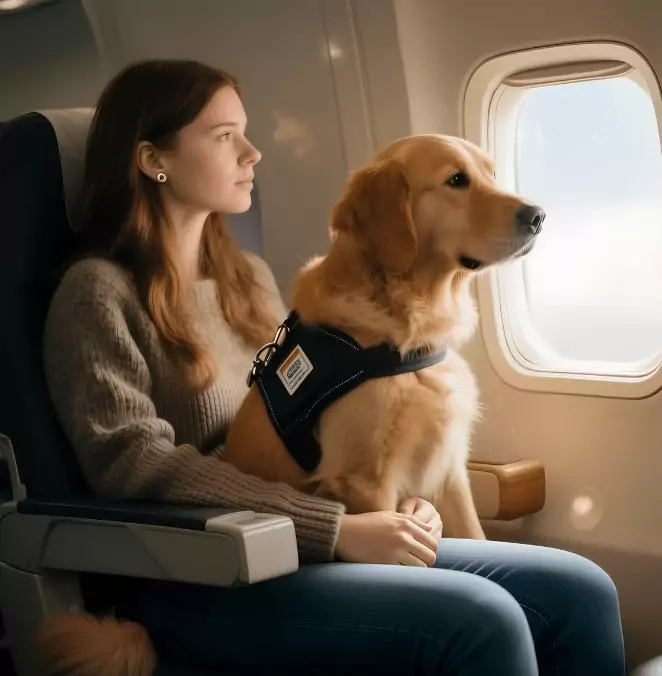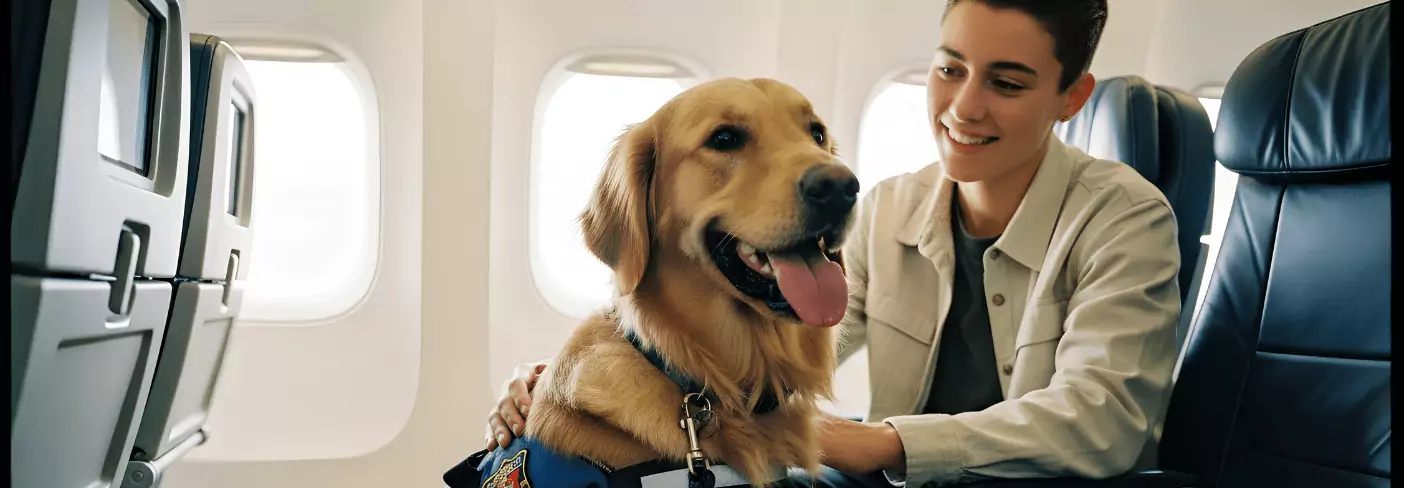WestJet Airlines
Psychiatric Service
Dog Policy




WestJet Airlines Main Takeaways:
-

Psychiatric service dogs fly free on all flights with required documentation for your disability.
-

Emotional support animals are no longer recognized as service animals and must travel as pets with fees.
-

Your dog must perform trained tasks for your mental health disability, not just provide comfort through its presence.
-

One service dog per passenger on most flights; two service dogs allowed if your itinerary includes U.S. flights.
-

Required documentation includes DOT Service Animal Air Transportation Form for U.S. flights and advance notification.
-

Service dogs must remain harnessed and fit within your foot space without encroaching on other passengers.
-

You must arrive with adequate time and notify WestJet at least 48 hours in advance for smooth check-in.
Understanding WestJet Airlines’ Service Animal Policy
WestJet Airlines welcomes passengers with disabilities traveling with trained psychiatric service dogs on all flights. Psychiatric service dogs travel free of charge in the aircraft cabin and receive full protection under applicable disability laws. This guide covers current regulations, required documentation, and what to expect when flying with a psychiatric service dog on WestJet.
The Air Carrier Access Act: Federal Law Governing Airline Policies
The Air Carrier Access Act (ACAA), enacted in 1986 and codified at 49 U.S.C. § 41705, prohibits discrimination against air travelers with disabilities. Enforced by the U.S. Department of Transportation through 14 CFR Part 382, the ACAA applies to all U.S. airlines and foreign airlines operating flights to or from the United States. The law requires airlines to allow trained service dogs in the cabin at no charge, provide boarding assistance, and make reasonable accommodations for passengers with disabilities.
For flights within Canada, WestJet complies with Canadian accessibility regulations under the Canadian Transportation Agency and the Accessible Canada Act. WestJet accepts psychiatric service dogs at no cost, processes required documentation, and ensures passengers with service dogs receive equal treatment.
Important Policy Change: Emotional Support Animals No Longer Recognized on Flights
Effective August 5, 2021, WestJet changed its service dog program following significant changes to the U.S. Department of Transportation’s rules on this topic. This fundamental change affected how airlines handle emotional support animals on all flights.
Before 2021: Old ESA Rules
- Service animals and emotional support animals both flew free in the cabin
- ESA letters from mental health professionals were accepted as sufficient documentation
- Multiple species were accommodated at no charge
- Minimal documentation requirements for ESAs
After 2021: Current ESA Rules
- Only trained service dogs are recognized as service animals
- Emotional support animals are no longer recognized as service animals
- ESAs must travel as regular pets with applicable fees and restrictions
- PSDs (task-trained) still qualify for free accommodation
- Stricter documentation requirements including DOT Service Animal Form for U.S. flights
Psychiatric Service Dogs vs. Emotional Support Animals
The key distinction is task training. Psychiatric service dogs must perform specific trained tasks such as interrupting panic attacks, reminding you to take medication, providing tactile stimulation during dissociative episodes, guiding you to safety during psychiatric episodes, waking you from nightmares, or creating physical barriers in crowded spaces. If your dog only provides comfort without performing trained tasks, it’s classified as an ESA and must travel as a pet with applicable fees and restrictions.
Advanced Notice
Notify WestJet when booking your reservation that you’ll travel with a psychiatric service dog, then inform staff again at airport check-in. While not always mandatory, WestJet strongly recommends providing at least 48 hours’ advance notice to ensure proper seating arrangements and smoother boarding.
Submit your DOT Service Animal Form when booking or as soon as possible before your flight for U.S. flights. If you purchase tickets less than 48 hours before departure, you may complete the form at the airport but should arrive with extra time for processing. For WestJet Vacations packages, provide minimum seven days’ notice.
Contact WestJet by phone at 1-888-937-8538 (1-888-WESTJET). You can also manage reservations and add service dog information online at www.westjet.com. If your itinerary includes flights operated by partner airlines, contact those airlines directly to confirm their service dog guidelines.

WestJet Airlines PSD Requirements
DOT Service Animal Form Requirements
The U.S. Department of Transportation Service Animal Air Transportation Form is mandatory for psychiatric service dogs on U.S. flights. You must:
- Attest to your dog’s task training for your psychiatric disability
- Confirm appropriate public behavior
- Verify your dog won’t threaten other passengers
- For flights over eight hours, attest your dog can refrain from relieving itself or do so sanitarily using absorbent pads
Download the form from transportation.gov and submit when booking or as early as possible before departure. For flights within Canada or other international destinations not involving the United States, the DOT form is not required, but WestJet may request documentation of your dog’s training and service purpose.
Training Requirements for Psychiatric Service Dogs
WestJet only accepts dogs to provide services to persons with disabilities. Service dogs must have been trained to do work or perform tasks for the benefit of a qualified individual with a disability. For all flights, service dogs must be individually trained by an organization or person specializing in service dog training.
Health Certificate Requirements
Health certificate requirements vary based on travel direction and destination:
- Traveling to Canada: Dogs entering Canada must meet Canadian Food Inspection Agency requirements. Dogs over three months old require proof of rabies vaccination administered at least 30 days before entry.
- Traveling to the United States: Must comply with CDC requirements including dogs being 6+ months old, valid rabies vaccination, microchip, and CDC Dog Import Form. Dogs from high-risk rabies countries need additional documentation.
- International destinations: Health and vaccination requirements vary by destination. Check specific country requirements well in advance through the consulate, embassy, or appropriate government authority.
Brachycephalic Breed Restrictions
Flat-faced breeds including Bulldogs, Pugs, Boston Terriers, Boxers, Shih Tzus, and Mastiffs can travel as psychiatric service dogs in the cabin. However, these breeds are susceptible to respiratory issues during air travel. Consult your veterinarian about your dog’s fitness to fly before booking, especially for older dogs or those with pre-existing respiratory conditions.
Behavior Standards During Flight
Your psychiatric service dog must remain harnessed, leashed, or tethered at all times in the airport and on the aircraft. The dog must stay under your control within your foot space or on your lap if small enough (no larger than an infant).
Your dog must behave appropriately without excessive barking, biting, jumping, or displaying aggression toward passengers or crew. Dogs cannot occupy seats or tray tables, and cannot block aisles or emergency exits.
WestJet may refuse transport or remove dogs that pose safety threats or cause significant disruptions during flight.
Seating Rules for Psychiatric Service Dog Handlers
You may select any available seat. Depending on aircraft type, you may be required to sit in a window seat due to space limitations beneath non-window seats.
WestJet accepts one service dog per person on flights within Canada and international flights. If your itinerary includes flights to or from the United States, WestJet accepts two service dogs per person, provided both fit within your seating area without encroaching on other passengers.
No Fees for Psychiatric Service Dogs
Psychiatric service dogs travel completely free under applicable disability laws. WestJet cannot charge for cabin access, documentation processing, or any disability-related accommodations. You only pay for your own passenger ticket.
Emotional Support Animals: Traveling as Pets on WestJet Flights
Since August 5, 2021, emotional support animals are no longer recognized as service animals on WestJet flights. Your emotional support animal must travel as a regular pet with all applicable fees and restrictions.
ESA Pet Fees
Cabin pets cost $50-$59 CAD for domestic and U.S. flights, or $100-$118 CAD for international flights. Checked pets cost $100-$118 CAD for domestic and U.S. flights, or $200-$236 CAD for international flights. Contact WestJet directly at 1-888-937-8538 for current pet fees on your specific flight.
Pet Carrier Size Requirements
Only dogs and cats at least eight weeks old are permitted as cabin pets. The carrier must fit completely under the seat in front of you with maximum dimensions of 41 cm L x 21.5 cm H x 25.4 cm W (16″ L x 8.5″ H x 10″ W). The carrier must be soft-sided, airline-approved, well-ventilated, leak-proof, and secure.
Pet Travel Requirements
Your pet must remain in the carrier throughout the entire flight. Vaccination records may be required depending on destination. Your pet carrier counts toward your carry-on baggage allowance. Space must be reserved at least 48 hours in advance. ESAs traveling as pets receive no special accommodations and are subject to all standard pet policies including breed restrictions and destination limitations.
WestJet’s Travel Requirements
WestJet has different requirements based on where a passenger travels with a pet or service dog.
Domestic
Hawaii requires advance notification and permits for service dogs. Contact Hawaii’s Rabies Quarantine Branch at (808) 483-7151 or [email protected] at least 7 days before departure for Honolulu, or apply for a Neighbor Island Inspection Permit (2-month processing time) for other islands.
International
- Service dogs are not permitted to or from Panama.
- Service dogs are permitted to Ireland and the United Kingdom, though pets are not accepted.
- Several destinations including Barbados, Jamaica, Iceland, and Glasgow do not accept pets, but service (assistance) dog policies are allowed. Contact WestJet’s Special Care Desk at 1-888-937-8538 to confirm before booking.
US Inbound
Dogs entering the U.S. must meet CDC requirements effective August 1, 2024. Requirements vary based on the dog’s location in the previous six months:
- Low-risk countries: Microchip, health verification, 6+ months age, CDC Dog Import Form
- High-risk countries (U.S. vaccinated): Above plus U.S. rabies vaccination certification
- High-risk countries (non-U.S. vaccinated, including Canada): Not accepted
Visit cdc.gov/importation/dogs for country classifications and complete requirements.

Having a hard time to decide?
licensed professional to see how Wellness Wag can help you qualify for an ESA letter online.










